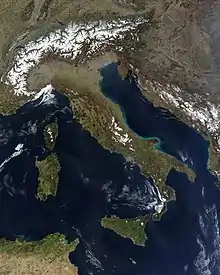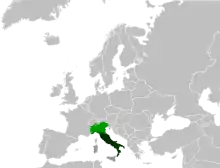
The Italian Peninsula (Italian: penisola italica or penisola italiana), also known as the Italic Peninsula, Apennine Peninsula or Italian Boot, is a peninsula extending from the southern Alps in the north to the central Mediterranean Sea in the south.
Overview
It is nicknamed lo Stivale (the Boot). Three smaller peninsulas contribute to this characteristic shape, namely Calabria (the "toe"), Salento (the "heel") and Gargano (the "spur").[1] The backbone of the Italian Peninsula consists of the Apennine Mountains, from which it takes one of its names. The peninsula comprises much of Italy and also includes the microstates of San Marino and Vatican City.
Physical geography

Geographically, the minimum extent of the Italian Peninsula consists of the land south of a line extending from the Magra to the Rubicon rivers, north of the Tuscan–Emilian Apennines. It excludes the Po Valley and the southern slopes of the Alps.[2][3] The Italian Peninsula has the only active volcano in mainland Europe, Mount Vesuvius.[4]
Political geography
In general discourse, "Italy" and "Italian peninsula" are often used as synonymous terms. However, northern Italy may be excluded from the Italian peninsula. From a political point of view, the Italian peninsula in the strict sense (therefore excluding insular Italy and northern Italy[5]) is divided into various states listed in the following table:[6][7]
| Country/ Territory |
Peninsular area | Description | |||
|---|---|---|---|---|---|
| Population[8] | km2 | sq mi | Share | ||
| 26,140,000 | 131,275 | 50,686 | 99.9531% | Effectively the entire peninsula | |
| 31,887 | 61.2 | 23.6 | 0.0466% | A central-eastern enclave of peninsular Italy | |
| 829 | 0.44 | 0.17 | 0.0003% | An enclave of Rome, Italy | |
See also
References
- ↑ "The BOOT of ITALY". Retrieved 5 October 2023.
- ↑ De Agostini Ed., L'Enciclopedia Geografica – Vol. I - Italia, 2004, p. 78.
- ↑ Touring Club Italiano, Conosci l'Italia – Vol. I: L'Italia fisica, 1957.
- ↑ "Mount Vesuvius, Italy: Map, Facts, Eruption Pictures, Pompeii".
- ↑ Vocabolario Treccani, Peninsulare
- ↑ De Agostini Ed., L'Enciclopedia Geografica - Vol. I - Italia, 2004, p.78
- ↑ Touring Club Italiano, Conosci l'Italia - Vol. I: L'Italia fisica, 1957
- ↑ Population includes only the inhabitants of the Italian peninsula (excluding Northern Italy and Insular Italy (Sicily and Sardinia)).
External links
 Media related to Italian Peninsula at Wikimedia Commons
Media related to Italian Peninsula at Wikimedia Commons